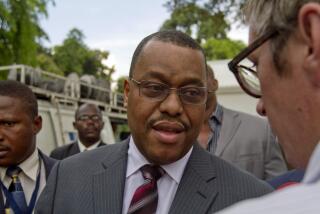Aristide’s Pick for Premier Rejects Offer, Sources Say : Haiti: Refusal could hurt president, whose second choice is called unqualified. Investor confidence may be shaken.
PORT-AU-PRINCE, Haiti — President Jean-Bertrand Aristide’s first choice for the crucial job of prime minister has rejected the offer, leaving the restored leader facing a possible lack of confidence in his government by international lenders and the Clinton Administration, according to Haitian and diplomatic sources.
Smart Michele, a wealthy businessman and close associate of Aristide, was offered the prime ministership last week in Washington, the sources said, but turned it down.
The sources said that Aristide’s second choice for prime minister is Claudette Werleigh, a little-known social activist with almost no support in the local business or international financial communities.
“Her appointment,” said one diplomat, “could lead to the unraveling of Aristide’s entire financial team” in the Cabinet. “It certainly would hurt the confidence (of foreign) investors in Aristide’s commitment to a modern, free-market economy.”
The most immediate result would be the likely refusal of Leslie Delatour to serve in the Cabinet.
Delatour, a widely respected former finance minister and World Bank consultant, has been Aristide’s chief economic adviser in recent months and drafted an economic program that triggered promises of significant financial aid from several wealthy nations.
Most U.S. officials involved in Haiti policy, including Secretary of State Warren Christopher, expected Delatour would be named either finance minister or president of the Central Bank.
If he is not appointed to a key financial post or refuses to accept a ministry rather than serve with Werleigh, the confidence in Aristide’s government among the international lending agencies and wealthy governments could be hurt, the sources said.
“The whole premise of the enthusiastic support of Aristide’s return by the donor nations and the IFIs (international financial institutions) was that Leslie (Delatour), Leslie Voltaire and Mrs. Rey would make up the financial center of the government,” one diplomat said.
He was referring to the widely held assumption that Delatour would be finance minister; Voltaire, a well-known planning expert, would be planning minister, and Marie-Michele Rey, a longtime and successful private banker, would head the Central Bank.
All are known as technocrats who advocate free-market economics, reduced government bureaucracy, privatization of public enterprises and alternative approaches to traditional government involvement in public affairs.
Werleigh’s appointment would not immediately endanger the half-billion-dollar multinational aid program already approved for Aristide’s government, international financial sources said.
But “it certainly could damage (private) investment prospects,” one expert said, “and it would cause us to look closely at projects in the future. It doesn’t build confidence, that is for certain.”
No reasons were made public for Michele’s refusal to take the prime minister’s post, but sources speculated that Michele, who quit Aristide’s first Cabinet, dislikes the indecisive manner in which Aristide is known to conduct affairs.
Many foreign and Haitian experts warned against concluding that Michele’s refusal was a crisis, pointing out that Aristide returned to power only Saturday after three years in exile.
However, other sources pointed out that Aristide had been preparing to return almost from the moment he was ousted by a military coup on Sept. 30, 1991, and was assured of his restoration a month ago when Haiti’s army leaders agreed to step down and U.S. troops entered Haiti to enforce the agreement.
Naming Werleigh, who has served as foreign minister under the caretaker Cabinet of the departing acting Prime Minister Robert Malval, is seen by several sources as a sign of weakness on Aristide’s part. Werleigh is considered an economic and financial neophyte, and the prospect of her heading the government has left some business people and diplomats shaking their heads.
After Michele declined, Aristide settled on Werleigh because he wanted a woman in a senior position, some sources said, and because she represents a commitment to social programs. She served briefly as minister of social planning in one of the abortive governments before Aristide won the country’s first democratic elections in 1990.
Aristide had originally settled on Michele, the sources said, for three reasons: The two men were close friends and knew one another’s thoughts; Michele was acceptable to the business and international financial community, and Michele accepted the need for a social agenda for the government.
One associate recalled that Michele resigned as commerce minister in Aristide’s original Cabinet because Aristide was inconsistent, telling him one thing and then changing his mind after hearing an opposing viewpoint.
Another source said the earlier disagreement centered on Aristide’s refusal to back Michele in his effort to reduce government subsidies to keep food and other consumer prices down.
In spite of the political, and possibly economic, turmoil generated by the controversy over the Cabinet, Aristide did move ahead on some items in his first full day of official work Tuesday.
A shipment of 150,000 barrels of gasoline, diesel and kerosene was to arrive Tuesday night, the first legal shipment of petroleum since an embargo was ordered in October, 1993.
Government officials said the fuel would be put on sale today with the price of gasoline about $3 a gallon, about 30% higher than the pre-embargo cost.
Aristide also signaled that his permanent army commander will be Bernardin Poisson, who was quietly promoted to brigadier general Monday by acting commander Maj. Gen. Jean-Claude Duperval.
More to Read
Sign up for Essential California
The most important California stories and recommendations in your inbox every morning.
You may occasionally receive promotional content from the Los Angeles Times.










